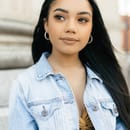*The views expressed in this article are the writer’s own and not indicative of the views of Her Campus or Her Campus at VCU*
The shooting at Marjory Stoneman Douglas High School in Parkland, one of the deadliest mass shootings in American history that killed 17 and injured the same number, has proved itself a history-maker in more ways than one. Ever since the tragedy that occurred on Valentine’s day, the students and citizens around the world have come together to fight for their cause in the ongoing gun restriction argument. From small protests to the students’ March for our Lives that occurred in our nation’s capital last month, the students of Marjory Stoneman Douglas High School want the world to know their cause and how gun violence has affected them. Some of them, including outspoken ones such as Cameron Kasky and Emma Gonzalez, have received a lot of media coverage, which along with celebrity endorsements and the sheer shock of the incident, has helped their movement gain traction immensely.
However, there is a group of Marjory Stoneman Douglas High School students whose struggle to gain media attention has fallen flat. On March 28, the black students and other students at Stoneman Douglas held a press conference to voice their concerns with the new procedures at their school and their classmates’ actions. They told the press, which was mostly made up of local stations, that due to the heavy police presence on the high school, campus, students of color were being unfairly targeted based on the color of their skin. They often used the term “militarization” when speaking about the new policies and procedures that have been implemented since the deadly tragedy that occurred there. They are just as passionate as their white counterparts that are gracing the cover of Time Magazine, and they struggle with the fact that they were not given the same voice as their white classmates, as they have a different perspective to give.
Mei-Ling Ho-Shing, a Douglas student of color, told WPEC-TV, “David Hogg, we’re proud of him, but he mentioned he was going to use his white privilege to be the voice for Black communities, and we’re kind of sitting there like, ‘You know there are Stoneman Douglas students who could be that voice.’” The point of being an ally is to support people, not speak for or over them. Black voices, especially in academia, are very often silenced, and I’m talking from both my own experience and that of others. You would think that an increased police presence at a high school that has gone through so much tragedy would be a welcome addition, but for black students at a predominately white school, it’s very different. Without even getting into police brutality, even without an indefinite police presence, black students are already targeted more than their white peers.
All students deserve to have a voice, especially on issues pertaining to their day to day life. It’s time to listen to the Douglas students of color. I’m so happy that they held this press conference and I’m excited to see where their journey takes them, especially as their own movement gains traction.



